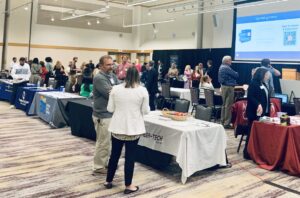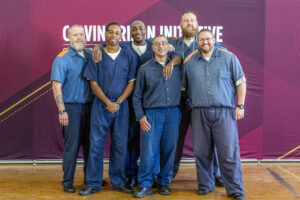Despite recent moderation of the hiring market, employers remain in need of consistently reliable sources of talent. Two opportunities in the coming weeks provide resources to meet that need for West Michigan employers.
This is important because federal data released this month reveals a dilemma amid encouraging news in the employment market: Although U.S. job openings slowed in July, they continue to outpace pre-pandemic levels, with 7.7 million openings. What’s more, the same set of data showed a one-month increase of total separations from employment (which can include resignations, layoffs and discharges) by 336,000, for a total of 5.4 million.
Economists view the latter datapoint as a measure of workers’ willingness or ability to leave a job — an expensive prospect for employers who have to replace them.
Inclusive hiring practices can provide the much-needed stability that employers and hiring managers seek. That’s why TalentFirst and its partners are helping employers tap into two immense and often-overlooked talent pools: neurodivergent workers and formerly incarcerated workers.
Bridging the talent gap

Neurodivergent people make up 15% to 20% of the total population, but they face significant barriers to employment and economic mobility. This amounts to “a waste of human potential that costs the U.S. economy and taxpayers billions in lost productivity and public safety-net benefits.”
These are among the findings of “Embracing Neurodiversity at Work: Unleashing America’s Largest Untapped Talent Pool,” a 2024 report for the American Enterprise Institute co-authored by Matthew Leger, who will be the keynote speaker at our next Talent Solutions Series event.
Leger estimates the neurodivergent workforce might be the largest untapped talent pool in America. But learning how to connect with these potential workers — and other underrepresented groups — can be a challenge. Our next Talent Solutions Series event provides multiple solutions in one place:
Bridge the Talent Gap: Gain Insights + Meet Partners + Access Untapped Talent
When: 2:30-4:30 p.m., Tuesday, Oct. 1
Where: Prince Conference Center & Hotel, 1800 E. Beltline Ave. SE, Grand Rapids
What: Gain insights on neurodiversity at work, network with peers and connect with dozens of local talent sources — education institutions, talent agencies, nonprofit providers and others — at our popular Partner Fair.
Register for BRIDGE THE TALENT GAP
“We eagerly look forward to forging impactful, lasting connections with employers and organizations to further discover opportunities to collaborate through Educate, Elevate!, our workforce development program,” said Maria Morales, director of workforce development and strategic impact for LAUP, one of the participants in the Partner Fair. “By collaborating, we cultivate a diverse, skilled workforce that benefits our community and meets employers’ talent needs.”
The opportunity of second-chance hiring

Another group that offers an opportunity for employers is the formerly incarcerated. These readily employable, loyal and often highly trained individuals offer a quality talent pool that too often is overlooked because employers lack the knowledge of how to hire them — or are wary of bringing on board someone with a criminal record.
As TalentFirst CEO Council member Jason Kehr, owner and president of Valley City Electronic Recycling, noted in a recent blog: “There really is a pipeline here for those who are willing to access it. You’ve got to have an open mind.”
Like Kehr, many West Michigan employers have discovered the advantage of second-chance hiring. And TalentFirst is partnering with Calvin University and the Michigan Department of Corrections to equip more HR leaders, managers, and business owners with the knowledge and skills to implement second-chance hiring.
Hiring Formerly Incarcerated Individuals
When: A 2- to 3-hour commitment anytime from Oct. 7-21
What: Participants learn at their own pace to earn a microcredential, including 2.5 SHRM professional development credits. Topics include:
- Understanding the criminal justice system
- Hiring considerations
- Employability
- Accessing supports and services
- Creating a flourishing culture
- Bonus: Those who complete the online training also have the option of joining an in-person workshop and a visit to observe one of the Corrections Department’s innovative job-training programs on Nov. 12. This part of the program earns an additional 7 SHRM credits.
Learn more and register
This is the second cohort of the program. Previous participants have praised the ROI for a minimal time commitment.
“If you are considering changing your company policies to open your hiring practices to hiring returning citizens, this is an excellent course to equip you with the facts needed to build your business case,” said Stephanie Schoenherr, director of Human Resource Operations for TalentFirst member Cascade Engineering, which has been deeply engaged in second-chance hiring for years.
“If you’re already engaged in this work, it’s a great refresher and reminder on why this work is so critical. The first-hand stories from returning citizens and participating organizations are inspiring and motivating.”
Taking the long view: Tracking regional progress
While these two opportunities offer immediate insights into inclusive hiring, TalentFirst’s long-term efforts continue to elevate best practices for attracting, developing and retaining diverse talent.
Employers that participate in our annual DE&I Benchmark Survey are completing their assessments this month on Workforce Demographics and DE&I Best Practices. They will receive confidential insights to their cultural and demographic landscape, providing a roadmap to their goals.
The aggregated anonymous results also allow us to track progress across our region on our DE&I Best Practices Dashboard.
The reason for these resources is founded on the advantages of inclusive hiring practices: For West Michigan to rank among the top 20% of regions for workforce quality nationally, employers must be able to attract, develop, and retain diverse talent.


